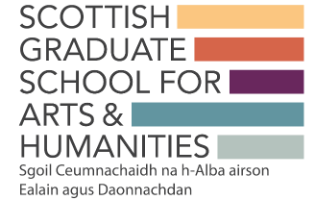SGSAH Summer School 2021
21st - 25th June
Keynote Speakers
A special guest (or more) will be delivering a keynote every day of the week between 1.30pm and 2.15pm. Explore the keynote sessions below and click here to register.

Read more about this keynote – Dr Mark Carrigan
Monday 21st of June, 1.30 - 2.15pm
This talk will discuss how the university has changed over the last 18 months, as well as which of these changes are likely to remain. We can’t expect that the university will snap back to pre-pandemic normality, particularly with regards to the central role that digital platforms now play in academic life. If we’re entering a future where online will have equivalent status to face-to-face then digital scholarship becomes essential to academic practice. Mark will explore what this means in practice, as well as offering strategies and techniques to thrive under these conditions. This also entails confronting the political questions which are opening up around the digital divide within higher education.
Biography
Dr Mark Carrigan is a Digital Sociologist based in the Faculty of Education at the University of Cambridge, where he organises activities within the Culture, Politics and Global Justice research cluster and works as an embedded researcher within the Digital Learning Working Group. Mark directs the Post-Pandemic University project which is an international network comprising an online magazine, podcast hub and conference series. He is the author of Social Media for Academics, published by Sage and now in its second edition. Mark’s forthcoming books The Public & Their Platforms (with Lambros Fatsis) and Post-Human Futures (with Douglas Porpora) explore the implications of digital platforms and emerging technologies for public scholarship and human personhood respectively.

Read more about this keynote roundtable discussion
Tuesday 22nd of June, 1.30 - 2.15pm
This roundtable will hear from researchers in the arts and humanities from across Scotland whose work informs or functions as activism. Interacting with and underpinning socially just change-making policy, their research is frequently conducted in partnership with external organisations. From gender inequalities in TV and film, refugee histories and lives, and inclusive youth literature and book trade activism, the panellists will discuss their research alongside the challenges, opportunities and urgency of carrying out such work.
Speakers include:
- Dr Susan Berridge, Lecturer in Film & Media, University of Stirling
- Dr Melanie Ramdarshan Bold, Senior Lecturer in Children's Literature Studies, University of Glasgow | @ILoveCopyright & @YAIdentities
- Katherine Mackinnon, SGSAH PhD researcher in refugee history, University of Glasgow | @KAMackinnon
- Dr Benjamin Thomas White, Senior Lecturer in History, University of Glasgow | @rain_later

Read more about this keynote – Dr Charlotte Lydia Riley
Wednesday 23rd of June, 1.30 - 2.15pm
In Britain today, historical research is under threat: history departments are being closed, historical research projects are being defunded, and historians are being demonised by politicians and newspapers. In the context of BLM, the Rhodes Must Fall and Colston Must Fall campaigns, and a wider movement to 'decolonise' our heritage sector and educational establishments, there has been a backlash from the political right in government and the media. The right has always been sceptical of the value of the arts and humanities; this scepticism fits neatly into the culture war that is currently raging around identity, history and experience in modern Britain. This talk will outline how this has unfolded, and will make a case for historians responding not by retreating and hoping not to be noticed, but by working to defend their public role.
Biography
Dr Charlotte Lydia Riley is lecturer in twentieth century British history at the University of Southampton. She has recently edited a book, Free Speech Wars: how did we get here and why does it matter (MUP 2021), and is writing another, Imperial Island, that examines the way that empire continues to shape British social, political and cultural history.
Twitter: @lottelydia

Read more about this keynote – Professor Celia Lury
Thursday 24th of June, 1.30 - 2.15pm
An inspiration for the book Problem Spaces was Richard Serra’s claim that ‘Drawing is a verb’. His artwork Verb List (1967–68) serves as a kind of manifesto for this pronouncement. In pencil, on two sheets of paper, in four columns of scripts, he lists the infinitives of 84 verbs—to roll, to crease, to fold, to store, for example—and 24 possible states or conditions—of gravity, of entropy, of photosynthesis, of nature among others. In interview, Serra says, ‘The problem I was trying to resolve … was: How do you apply an activity or a process to a material and arrive at a form that refers back to its own making?’. The art critic Rosalind Krauss suggests that the list describes Serra’s practice in terms of action that ‘simply acts, and acts, and acts’ (1985: 101). Serra himself draws attention to the relations in which the action that ‘simply acts’ takes place: he describes the list as a series of ‘actions to relate to oneself, material, place, and process’ (Buchloh 2000: 7, my emphasis). Problem Spaces tries to describe what this might involve at a time when the epistemic infrastructures in which knowledge is produced are undergoing radical change.
Biography
Celia Lury is Professor in the Centre for Interdisciplinary Methodologies at the University of Warwick.

Read more about the Dear Green Bothy Pop-Up
Friday 25th of June, 1.30 - 2.30pm
This pop-up event is hosted in collaboration with the University of Glasgow's College of Arts initiative 'The Dear Green Bothy', aimed at demonstrating the vital role played by arts and humanities research in understanding and addressing climate emergency.
The event will feature short presentations from PhD researchers exploring existing and emergent research in the areas of climate emergency and the environmental humanities.
Find out more about the speakers and topics below.
- Liam Crouse | University of the Highlands and Islands | 'The Grey Ocean a Hazel Forest': Memory and Environmental Change in the Gàidhealtachd
- Leanne Gonczarow | University of Edinburgh | On reflection
- Skye Loneragan | Glasgow Caledonian University | How are we becoming what it is we are trying to throw away? Thinking with nano-plastics as one of the invisible ways we are connected in the current eco-emergency
- Catherine Mackenzie | University of St Andrews | The Children are not our Future
- Nicole Manley | Queen Margaret University | A process of walking and reflecting with River - a different way for human/river relationship
- Maria Sledmere | University of Glasgow | flotsam: a poem from neutral milky halo





